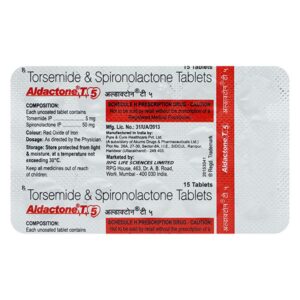SPIRONOLACTONE
SPIRONOLACTONE: Drug Name: Spironolactone
Use: Spironolactone is a medication that is primarily used to treat conditions such as high blood pressure, heart failure, and fluid retention (edema) caused by various conditions such as liver disease, kidney disease, or heart failure. It is also sometimes used to treat conditions such as polycystic ovary syndrome (PCOS) and hirsutism (excessive hair growth) in women.
Mechanism of Action: Spironolactone belongs to a class of medications called potassium-sparing diuretics. It works by blocking the actions of a hormone called aldosterone. Aldosterone normally causes the body to retain sodium and water while eliminating potassium. By blocking aldosterone, spironolactone helps the body to eliminate excess fluid while retaining potassium.
Dose: The recommended dose of spironolactone varies depending on the condition being treated. For high blood pressure, the usual starting dose is 25-50 mg once daily, which may be increased as needed. For heart failure, the initial dose is generally 25 mg once daily, and it may be increased to 50-100 mg once daily. The dose for fluid retention typically ranges from 25-200 mg daily. The exact dosage should be determined by a healthcare professional.
Side Effects: Spironolactone may cause a range of side effects including:
1. Increased urination
2. Drowsiness or dizziness
3. Nausea or vomiting
4. Stomach pain or diarrhea
5. Headache
6. Breast tenderness or enlargement in both men and women
7. Irregular menstrual periods in women
8. Erectile dysfunction or decreased libido in men
9. Electrolyte imbalances such as hyperkalemia (high potassium levels) or hyponatremia (low sodium levels)
10. Allergic reactions such as rash, itching, or difficulty breathing (rare)
It is important to note that spironolactone may interact with other medications, so it is necessary to inform your healthcare provider about all other medications you are taking. Additionally, it should be used cautiously in patients with kidney or liver disease, as it can affect electrolyte balance and kidney function. Regular blood tests may be required to monitor potassium levels while on spironolactone.

